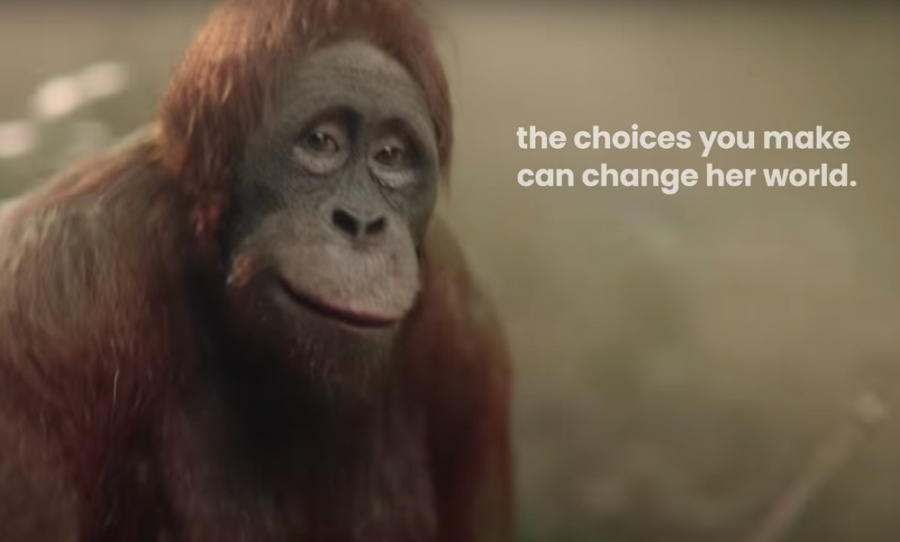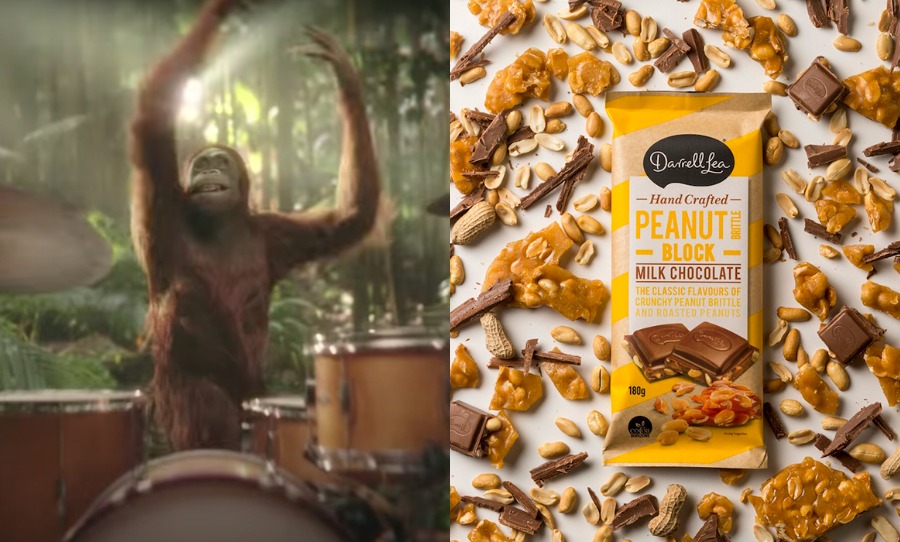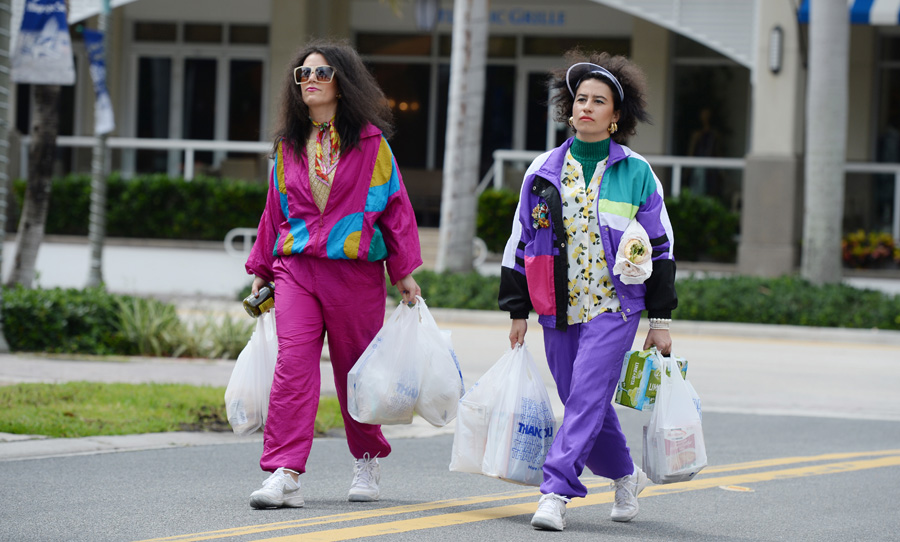Darrell Lea has released a new campaign to promote the news that they’re palm oil free – but why are they ripping off Cadbury and is it really time to sing Freedom?
Darrell Lea has become the first homegrown chocolate brand to go 100 per cent palm oil free, replacing it with sunflower oil in all of their products.
After announcing the decision back in August, last Tuesday Darrell Lea unveiled a new campaign to promote the news. The feel-good advertisement features an orangutan planted behind a drumkit, banging along to George Michael’s Freedom ‘90 in the middle of a forest.

Along with the campaign, Darrell Lea created an online educational resource for their customers, explaining the negative impacts of palm oil production and the process they went through to remove it from their 100+ products.
“There is growing awareness of the devastating impacts on natural habitats and endangered species associated with palm oil production,” Darrell Lea marketing director Tim Stanford described, according to Mumbrella. “Our consumers told us they would prefer our products to be palm oil free. We listened and we took action.”
Derived from the fruit of an oil palm tree, palm oil has become the most widely consumed vegetable oil on the planet. It’s found in everything from biscuits to shampoo, and it’s used in around 50% of the items you find in a supermarket.
Whilst it’s cheap to produce and has a high yield, unfortunately, it has a hugely negative impact on the environment. Its production is the biggest force behind Indonesian deforestation, a process which threatens the habitats of endangered species like orangutans, rhinos, and tigers and contributes to greenhouse gas emissions in a major way.
Did you know that if you see vegetable oil in a product’s ingredients, there’s a good chance it could actually be palm oil?
We’re trying to get to the bottom of this confusing issue.
If you’re confused, we know how you feel! All we want is for Australia to #LabelPalmOilAlready pic.twitter.com/LVYTAREfuP
— Zoos Victoria (@ZoosVictoria) February 28, 2019
Currently, it’s not mandatory under Australian law for products to list palm oil as an ingredient, and consequently, it’s often disguised on packaging simply as “vegetable oil”. Darrell Lea have pledged to change all their packaging by March 2021 to reflect the newly included sunflower oil, a job which they’ve described involves adjusting “millions of individual products”.
Yet, when you get down to the nitty-gritty of palm oil, the truth about ditching it isn’t that simple. Because palm oil is so efficient to produce (oil palm trees are easy to grow, produce all year round, and have the highest yield per hectare), a potential substitution may actually require ten times the land in order to grow the same amount.
Sunflower oil, for instance, often has high environmental impacts due to its low yield. For this reason, many argue that boycotting palm oil will ultimately lead to an even worse outcome.
Why palm oil is so cheap pic.twitter.com/PNPrBYWxRD
— Business Insider (@businessinsider) September 4, 2020
Instead, the solution seems to lie in growing palm oil sustainably. In 2004, the Roundtable on Sustainable Palm Oil (RSPO) was created and the NGO went on to create a set of sustainability criteria, eventually using its trademark to certify products. The organisation has not been without its criticisms, but after taking on the high carbon stock approach in 2018 (a method which ranks areas of forest, protecting the most vulnerable), it ensured that certified sustainably grown palm oil was finally deforestation-free.
Whilst going sustainable is not an easy process due to hurdles like highly complex supply chains and opposition from various governments, about 19% of all palm oil is now certified by the RSPO.
More than 4,800 companies – from growers to consumer brands and NGOs, are already involved in #SustainablePalmOil!
Will you be part of the change too? pic.twitter.com/GCndifKOhy
— Roundtable on Sustainable Palm Oil (@RSPOtweets) August 31, 2020
Australian-made Cadbury Dairy Milk chocolate doesn’t contain any palm oil; however, the oil is used in the flavoured centres of some of their chocolates and currently, this palm oil has been sustainably sourced since the end of 2017.
So, is no palm oil better than sustainable palm oil?
Here’s the thing: it seems there’s no easy answer. But at this point, sustainably produced palm oil is probably better than another form of oil, if and only if, it actually is produced sustainably.
That’s not to say that Cadbury is better than Darrell Lea. When you compare the two on Shop Ethical, Cadbury has a whole lot more problems attached to its brand and parent company in comparison to Darrell Lea.
#TheProjectTV. Definitely bravo to Darryl Lea. If it doesn’t state the exact oil used don’t buy it. Vegetable oil is generic and 99% of the time u just supported the murder of an Orangutan!
— Michael B (ACTOR) (@michaelbremer1) September 4, 2020
But in the glitz and glamour of corporate advertising, it’s easy to lose the nuances around the issue. Darrell Lea’s new commercial, whilst built on a message of positive social change, risks oversimplifying the problem and teaching its consumers one precarious message: palm oil is bad.
Palm oil isn’t bad. Or at least it’s no worse than any other oil. The problem is in the way we produce it. Such a glamorised portrayal of Darrell Lea’s move to go palm oil free – with the orangutan’s palpable euphoria and George Michael’s declarations of “Freedom!” all tugging on the heartstrings – risks gliding over the sombre reality that the devastation wreaked by the production of palm oil is still occurring and that the action of one company isn’t going to save the world.
Darrell Lea chocolate has announced they’re now 100% palm oil free! WOW thank god they didn’t address the dairy issue bc now there’s an option if you wanna save the orangutans but don’t want to accidentally save a cow while you’re at it
— Zac Bird (@zaccharybird) September 3, 2020
But of course, we don’t want to punish companies for taking steps towards the better. The real question is why has it taken so long for this to happen, and why, in 2020, is corporate sustainability still an act of superstardom and not the benchmark?
Corporate social responsibility is more important now than ever before. It has to embrace human rights in all its forms.
— Paul Quigley (@UppityBum) September 3, 2020
And finally, what about the ad?
As many have pointed out, the commercial is hugely reminiscent of the famous 2007 Cadbury campaign, in which a gorilla plays along to that iconic drum moment from Phil Collins‘ In The Air Tonight. The similarity is no doubt intentional; although it’s a move which is sure to raise eyebrows considering Darrell Lea’s sketchy history of appropriation when it comes to commercials.
It was only just over a year ago that the company found itself in hot water after they released a campaign featuring their very own take on Yellow Pages’ iconic Not Happy, Jan! commercial.
The campaign was pulled after Yellow Pages’ parent company Sensis claimed they were “cheapening” an icon, issuing a cease and desist letter. Sensis alleges that Darrell Lea sought neither their consultation nor approval in using the concept, much to the “shock” of Yellow Pages and their customers.
Darrell Lea’s No worries, Jan was created by Melbourne creative agency, Akkomplice – the same agency which created their latest Cadbury-reimagining campaign. It seems absurd that they’d even go there again, but perhaps that’s the point: an audacious wink to their past – or a cheeky jab at their competitor.
Wowee😯Darrell Lea having a big crack at Cadbury tonight before #sbstdf Might have to reconsider my #toursnacks chocolate #couchpeloton
— michael addison (@addo1984) September 2, 2020
Whilst the notion of reinventing and pastiching ads is neat (much like remakes and intertextuality are in movies), the ambiguity here around the ad’s intention can’t help but come off as slightly disingenuous. Why do we have to cloak the issue of palm oil in sensationalism and muddle it with problems of copyright?
So far there has been no response from Cadbury; however, if there is, it wouldn’t be the first time Cadbury and Darrell Lea have butted heads, with the pair ending up in court back in 2008 over Darrell Lea’s right to use the colour purple. (Needless to say, Darrell Lea won).
Did Darrell Lea just throw giant shade against @CadburyAU in the ad games #PalmOil
— kelly thomas (@kelsytomo) September 1, 2020
Whilst the issue of palm oil is certainly not as simple as Darrell Lea makes it out to be, perhaps one of the most valuable things to come out of their new campaign is increased awareness. Ultimately, the problem of palm oil is much larger than any one company, person, or action. It’s about a conversation that needs to be had and kept on having. And for many people, Darrell Lea just started a new one.
For more information on how you can shop sustainable palm oil products and make a difference, head to WWF.



